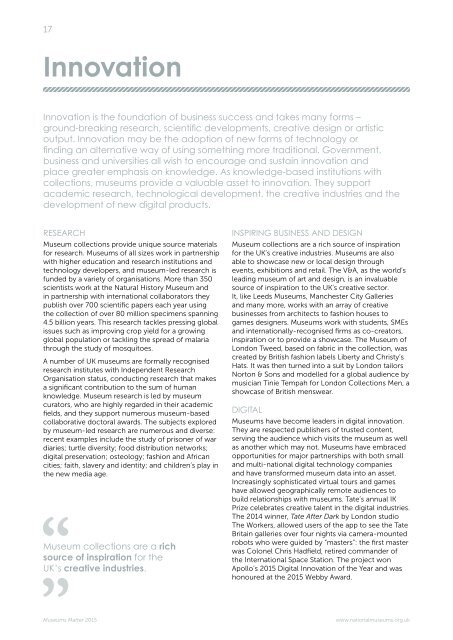Museums Matter
museums_matter_web
museums_matter_web
You also want an ePaper? Increase the reach of your titles
YUMPU automatically turns print PDFs into web optimized ePapers that Google loves.
17<br />
Innovation<br />
Innovation is the foundation of business success and takes many forms –<br />
ground-breaking research, scientific developments, creative design or artistic<br />
output. Innovation may be the adoption of new forms of technology or<br />
finding an alternative way of using something more traditional. Government,<br />
business and universities all wish to encourage and sustain innovation and<br />
place greater emphasis on knowledge. As knowledge-based institutions with<br />
collections, museums provide a valuable asset to innovation. They support<br />
academic research, technological development, the creative industries and the<br />
development of new digital products.<br />
RESEARCH<br />
Museum collections provide unique source materials<br />
for research. <strong>Museums</strong> of all sizes work in partnership<br />
with higher education and research institutions and<br />
technology developers, and museum-led research is<br />
funded by a variety of organisations. More than 350<br />
scientists work at the Natural History Museum and<br />
in partnership with international collaborators they<br />
publish over 700 scientific papers each year using<br />
the collection of over 80 million specimens spanning<br />
4.5 billion years. This research tackles pressing global<br />
issues such as improving crop yield for a growing<br />
global population or tackling the spread of malaria<br />
through the study of mosquitoes.<br />
A number of UK museums are formally recognised<br />
research institutes with Independent Research<br />
Organisation status, conducting research that makes<br />
a significant contribution to the sum of human<br />
knowledge. Museum research is led by museum<br />
curators, who are highly regarded in their academic<br />
fields, and they support numerous museum-based<br />
collaborative doctoral awards. The subjects explored<br />
by museum-led research are numerous and diverse:<br />
recent examples include the study of prisoner of war<br />
diaries; turtle diversity; food distribution networks;<br />
digital preservation; osteology; fashion and African<br />
cities; faith, slavery and identity; and children’s play in<br />
the new media age.<br />
Museum collections are a rich<br />
source of inspiration for the<br />
UK’s creative industries.<br />
INSPIRING BUSINESS AND DESIGN<br />
Museum collections are a rich source of inspiration<br />
for the UK’s creative industries. <strong>Museums</strong> are also<br />
able to showcase new or local design through<br />
events, exhibitions and retail. The V&A, as the world’s<br />
leading museum of art and design, is an invaluable<br />
source of inspiration to the UK’s creative sector.<br />
It, like Leeds <strong>Museums</strong>, Manchester City Galleries<br />
and many more, works with an array of creative<br />
businesses from architects to fashion houses to<br />
games designers. <strong>Museums</strong> work with students, SMEs<br />
and internationally-recognised firms as co-creators,<br />
inspiration or to provide a showcase. The Museum of<br />
London Tweed, based on fabric in the collection, was<br />
created by British fashion labels Liberty and Christy’s<br />
Hats. It was then turned into a suit by London tailors<br />
Norton & Sons and modelled for a global audience by<br />
musician Tinie Tempah for London Collections Men, a<br />
showcase of British menswear.<br />
DIGITAL<br />
<strong>Museums</strong> have become leaders in digital innovation.<br />
They are respected publishers of trusted content,<br />
serving the audience which visits the museum as well<br />
as another which may not. <strong>Museums</strong> have embraced<br />
opportunities for major partnerships with both small<br />
and multi-national digital technology companies<br />
and have transformed museum data into an asset.<br />
Increasingly sophisticated virtual tours and games<br />
have allowed geographically remote audiences to<br />
build relationships with museums. Tate’s annual IK<br />
Prize celebrates creative talent in the digital industries.<br />
The 2014 winner, Tate After Dark by London studio<br />
The Workers, allowed users of the app to see the Tate<br />
Britain galleries over four nights via camera-mounted<br />
robots who were guided by “masters”: the first master<br />
was Colonel Chris Hadfield, retired commander of<br />
the International Space Station. The project won<br />
Apollo’s 2015 Digital Innovation of the Year and was<br />
honoured at the 2015 Webby Award.<br />
<strong>Museums</strong> <strong>Matter</strong> 2015<br />
www.nationalmuseums.org.uk


